人教版七年级下册Unit 11 How was your school trip?Section B1a-2c课件(共58张PPT)
文档属性
| 名称 | 人教版七年级下册Unit 11 How was your school trip?Section B1a-2c课件(共58张PPT) |  | |
| 格式 | pptx | ||
| 文件大小 | 57.3MB | ||
| 资源类型 | 教案 | ||
| 版本资源 | 人教新目标(Go for it)版 | ||
| 科目 | 英语 | ||
| 更新时间 | 2022-08-24 22:07:05 | ||
图片预览

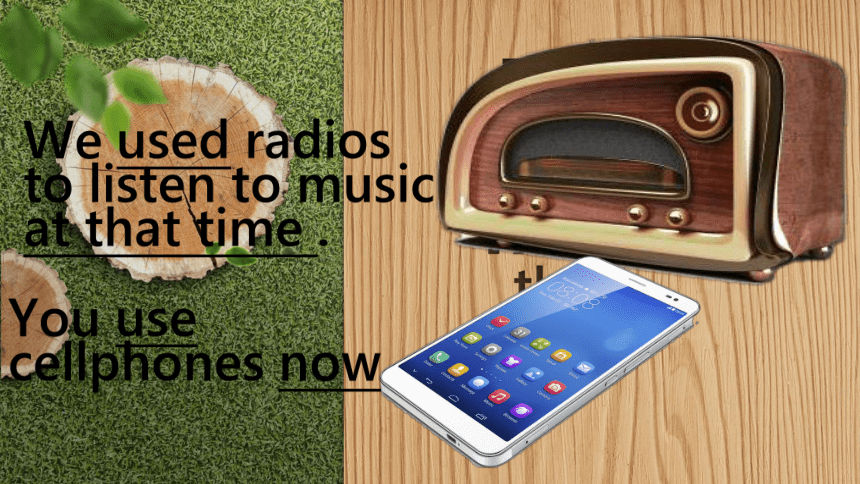
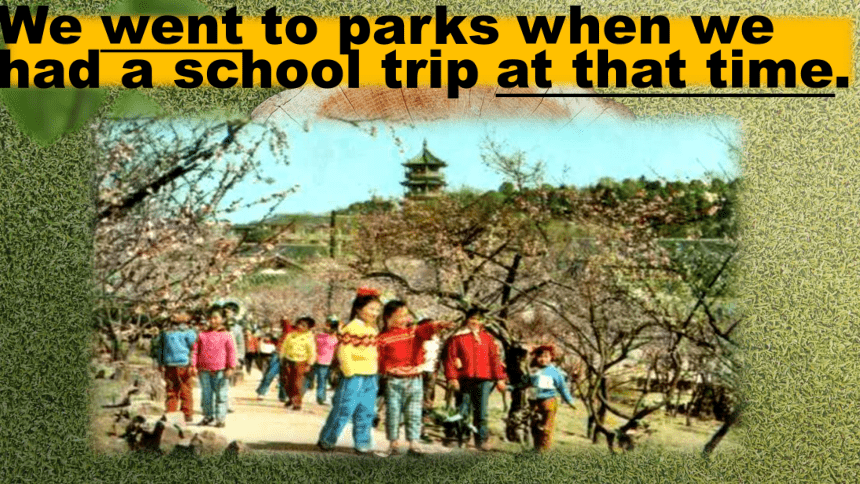
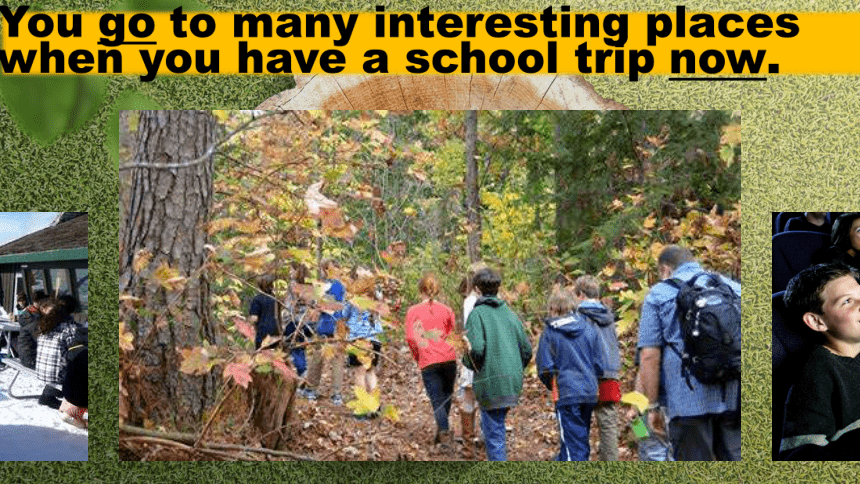
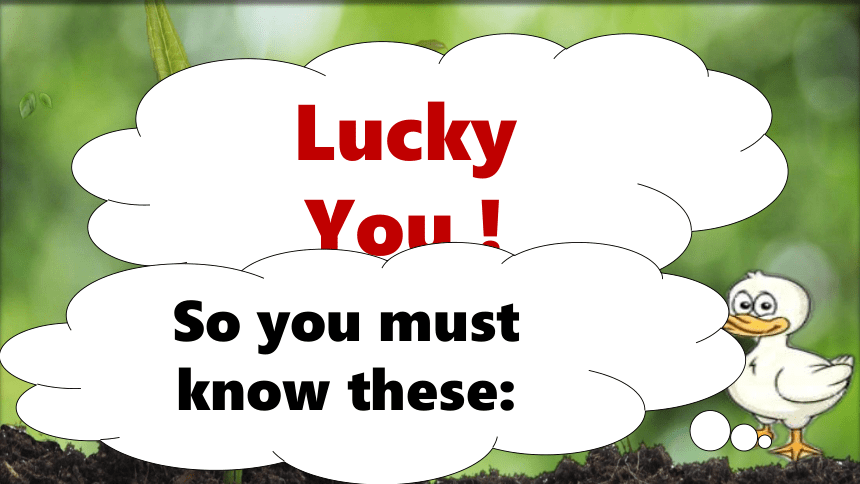
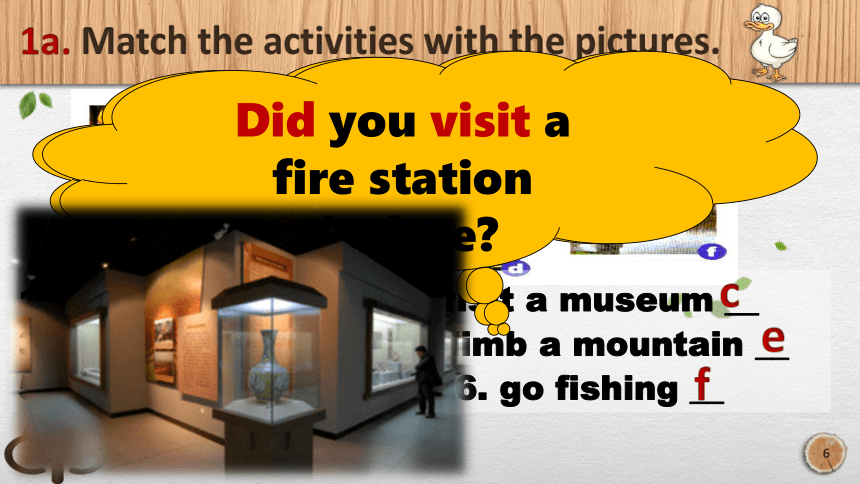


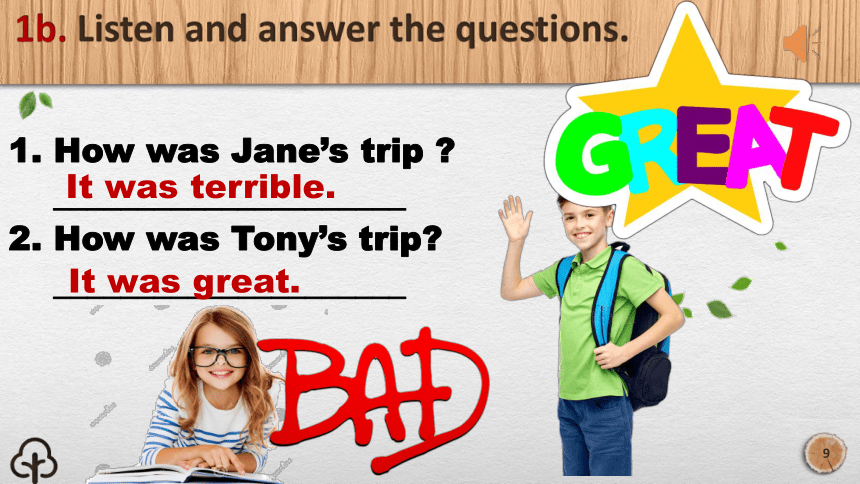



文档简介
(共58张PPT)
Unit 11
Sec B-1a-2c
How
Was
Your
School
Trip
Do
you
like
this
song
We used radios
to listen to music
at that time .
You use
cellphones now.
We went to parks when we
had a school trip at that time.
You go to many interesting places
when you have a school trip now.
Lucky
You !
So you must
know these:
1a. Match the activities with the pictures.
1. go to the zoo __ 2. visit a museum __
3. ride a horse __ 4. climb a mountain __
5. visit a fire station __ 6. go fishing __
Did you visit a
museum before
a
e
b
c
d
f
Did you visit a
fire station
before
1b. Listen and answer the questions.
1. How was Jane’s trip
_____________________
2. How was Tony’s trip
_____________________
It was terrible.
It was great.
1c. Listen again. What did Jane and Tony do on their last school trip Check(√) Tony or Jane.
went to the countryside climbed a mountain went to an art museum saw some paintings drew pictures
Tony
Jane
√
√
√
√
√
went to an
art museum
saw ...
took ...
had ... The food was...
drew ... It was...
Listen again and fill in the blanks.
Jane’s last school trip was ______. And she _____ to the countryside. But the weather ______ so cold. It _____ and _____ all day.
Tony _____ a great school trip. He ____ to an art museum and there ____ so many interesting things to see. He _____ some really beautiful paintings. Then he _____ lunch at the museum restaurant. After that, he went to a special art room and _____ pictures. So Tony’s trip was _____.
terrible
went
was
rained
rained
had
went
were
saw
had
drew
great
1d. What was your last school trip like Discuss it
with your partner using the following words.
I went
to ...
That
sounds ...
PAIR WORK
1d. What was your last school trip like Discuss it
with your partner using the following words.
A: How was your school trip
B: It was __________.
A: What did you do there
B: I __________.
A: How was the food there
B: It was ___________.
A: How was the weather
B: It was ___________.
Try to talk
including
these:
What words can you describe your last trip
GOOD
BAD
2a. Do the words describe good things or bad things Put a √ for good
and an × for bad. Leave a blank if they can mean both.
____ interesting ____ difficult ____ lovely ____ slow
____ exciting ____ boring ____ cool ____ hot
____ lucky ____ large ____ expensive ____ terrible
____ delicious ____ great ____ cheap ____ fast
Maybe you need
a small talk
in pairs.
√
√
√
√
√
√
√
√
×
×
×
×
×
Sometimes it
depends on what
you think.
Do you want to go
on a school trip to
the science
museum
Are you
interested
in robots
What do you
know about
robots
What do we need if we go on a school trip
SCHOOL TRIP
money
food
map
a camera or phone
to take photos
guide
hear the
gifts
buy for ...
Fast reading
Read the passage quickly and tell:
What kind of article
A. a story
B. a diary
C. a news
What is it about
A. a train
B. a school
C. a school trip
A DIARY is a daily record of personal
activities, reflections, or feelings.
Do you keep
a diary
Helen
Jim
They had a school trip and they wrote a dairy after the school trip.
Careful Reading
Skim and tell:
Q
1. Did Helen and Jim
go on the same trip
2. How do they feel
about the trip
Careful Reading
scan and tell:
1.Did Helen and Jim go on the same trip
Yes, they did.
Careful Reading
scan and tell:
2.How does Helen feel about the trip
It was interesting and exciting.
Careful Reading
scan and tell:
2.How does Jim feel about the trip
It was terrible. He didn’t like the trip at all.
Scanning
Finish the mind map:
School trip
When
Where
How
On June 15th
went to the museum
Helen
Jim
exciting
terrible
feeling
by train
What can
robots do
PAIR WORK
What can
robots do
What else can
robots do
Find out all the adjectives while listening.
Underline good feelings and circle bad feelings.
Post reading
Read the diaries again and complete the chart.
How do Helen and Jim describe these things
Helen Jim
the trip
the train
the museum
the gift shop and gifts
interesting
terrible
so hot and slow
big,boring,dark
so expensive.
lovely,
not
expensive.
so fast
interesting
They had a same school trip. But
Helen thought ... was ...
Jim thought... was ...
Why
Helen
Jim
They had a school trip and they wrote a dairy after the school trip.
1.different interests.
2.to see things differently.
Find out all the past forms.
2.visited—
4.got—
6.learned—
8.could—
10.took—
12.were—
1.went—
3.was—
5.saw—
7.did—
9.taught—
11.bought—
learn
visit
go
teach
is
take
get
buy
see
are
can
do
GROUP WORK
GROUP WORK
Name Where What Feeling
Helen went to the science museum by... learned a lot about… the guide taught… 3.took… 4.went to… lovely… 5.They…expensive. exciting
Jim Everything was… not interested in… 2.the rooms were…and it was difficult to… 3.there were also too many people…couldn’t…4.the things in the gift shop… terrible
didn't like...
RULES
1. Everyone is involved.
3. English only.
2. Tell me more.
My school trip
Imagine you had a school trip to the zoo yesterday.
1.How did you go
2.What did you do
3.How was the trip
My school trip
I had a school trip to the zoo yesterday.
We went there by bus. It was fast.
We saw a lot of animals. My favourite...
I took some photos.
We also had a class photo. I like...
It was great! I was very...
1.Real
2.Great or terrible
3.Including those three questions
4.English only
RULES
Show Time
Language Points
1. Then the guide taught us how to make a model robot.
teach sb. to do sth. 教某人做某事
teach sb. sth. 教某人某事
how to do sth.怎样去做某事
Language Points
2. I didn’t know they could play chess
with us.
play 后面接球类、棋类、牌类等体育运动名称时,前面不加冠词,如:play basketball, play chess, play cards。 play后接乐器时,前面则加定冠词,如: play the violin, play the piano.
Language Points
3.All in all, it was an exciting day.
all in all 总的说来; 总之; 整体上说
用来对所阐述的内容进行概括性总结及归纳。如:
总的说来, 我认为你干得很好。
All in all, I think you did a good job.
Language Points
4. exciting adj. 意为“令人兴奋的, 使人激动的” , 通常主语是物/事件。
excited adj. 意为“感到兴奋的; 激动的” , 通常主语是人。如:
e.g. Are you ________ about going to
Beijing
He told us an __________ story
yesterday.
excited
exciting
Language Points
5.today’s school trip
表示有生命的东西的名词及某些表示时间、距离、星球、世界、国家等无生命的东西的名词后加 ’s来表示所有关系,叫做名词所有格。
例如: men’s room 男厕所
a mile’s distance 一英里的距离
但如果该名词是以-s或-es接尾,则只在该名词后加“ ’ ”来构成所有格。
例如: 3 hours’ walk 三小时的路程
two miles’ distance 两英里的距离
Language Points
6. I’m not interested in that.
be interested in意为“对……感兴趣”,主语通常为人,其后可接名词、代词或动词 ing形式等。如:
My brother _________________ basketball.
我弟弟对篮球感兴趣。
She ___________________ running last year.
去年她对跑步感兴趣。
is interested in
was interested in
Language Points
6. I’m not interested in that.
interested 一般修饰人,对……感兴趣 (be
interested in sth)
interesting 一般修饰事或物,令人感兴趣的,有意思的
E.g. English is interesting.
We are interested in English.
excited 感到振奋的
exciting 令人振奋的
bored 感到厌倦的
boring 令人厌倦的,无聊的
类似的还有:
Language Points
7.… it was difficult to take photos.
It is + adj. (for sb.) to do sth.
(对某人来说)做 …... 怎么样
如: 对我来说骑车上学很容易。
__________________________ to school by
bike.
It is easy for me to go
HOMEWORK
Unit 11
Sec B-1a-2c
How
Was
Your
School
Trip
Do
you
like
this
song
We used radios
to listen to music
at that time .
You use
cellphones now.
We went to parks when we
had a school trip at that time.
You go to many interesting places
when you have a school trip now.
Lucky
You !
So you must
know these:
1a. Match the activities with the pictures.
1. go to the zoo __ 2. visit a museum __
3. ride a horse __ 4. climb a mountain __
5. visit a fire station __ 6. go fishing __
Did you visit a
museum before
a
e
b
c
d
f
Did you visit a
fire station
before
1b. Listen and answer the questions.
1. How was Jane’s trip
_____________________
2. How was Tony’s trip
_____________________
It was terrible.
It was great.
1c. Listen again. What did Jane and Tony do on their last school trip Check(√) Tony or Jane.
went to the countryside climbed a mountain went to an art museum saw some paintings drew pictures
Tony
Jane
√
√
√
√
√
went to an
art museum
saw ...
took ...
had ... The food was...
drew ... It was...
Listen again and fill in the blanks.
Jane’s last school trip was ______. And she _____ to the countryside. But the weather ______ so cold. It _____ and _____ all day.
Tony _____ a great school trip. He ____ to an art museum and there ____ so many interesting things to see. He _____ some really beautiful paintings. Then he _____ lunch at the museum restaurant. After that, he went to a special art room and _____ pictures. So Tony’s trip was _____.
terrible
went
was
rained
rained
had
went
were
saw
had
drew
great
1d. What was your last school trip like Discuss it
with your partner using the following words.
I went
to ...
That
sounds ...
PAIR WORK
1d. What was your last school trip like Discuss it
with your partner using the following words.
A: How was your school trip
B: It was __________.
A: What did you do there
B: I __________.
A: How was the food there
B: It was ___________.
A: How was the weather
B: It was ___________.
Try to talk
including
these:
What words can you describe your last trip
GOOD
BAD
2a. Do the words describe good things or bad things Put a √ for good
and an × for bad. Leave a blank if they can mean both.
____ interesting ____ difficult ____ lovely ____ slow
____ exciting ____ boring ____ cool ____ hot
____ lucky ____ large ____ expensive ____ terrible
____ delicious ____ great ____ cheap ____ fast
Maybe you need
a small talk
in pairs.
√
√
√
√
√
√
√
√
×
×
×
×
×
Sometimes it
depends on what
you think.
Do you want to go
on a school trip to
the science
museum
Are you
interested
in robots
What do you
know about
robots
What do we need if we go on a school trip
SCHOOL TRIP
money
food
map
a camera or phone
to take photos
guide
hear the
gifts
buy for ...
Fast reading
Read the passage quickly and tell:
What kind of article
A. a story
B. a diary
C. a news
What is it about
A. a train
B. a school
C. a school trip
A DIARY is a daily record of personal
activities, reflections, or feelings.
Do you keep
a diary
Helen
Jim
They had a school trip and they wrote a dairy after the school trip.
Careful Reading
Skim and tell:
Q
1. Did Helen and Jim
go on the same trip
2. How do they feel
about the trip
Careful Reading
scan and tell:
1.Did Helen and Jim go on the same trip
Yes, they did.
Careful Reading
scan and tell:
2.How does Helen feel about the trip
It was interesting and exciting.
Careful Reading
scan and tell:
2.How does Jim feel about the trip
It was terrible. He didn’t like the trip at all.
Scanning
Finish the mind map:
School trip
When
Where
How
On June 15th
went to the museum
Helen
Jim
exciting
terrible
feeling
by train
What can
robots do
PAIR WORK
What can
robots do
What else can
robots do
Find out all the adjectives while listening.
Underline good feelings and circle bad feelings.
Post reading
Read the diaries again and complete the chart.
How do Helen and Jim describe these things
Helen Jim
the trip
the train
the museum
the gift shop and gifts
interesting
terrible
so hot and slow
big,boring,dark
so expensive.
lovely,
not
expensive.
so fast
interesting
They had a same school trip. But
Helen thought ... was ...
Jim thought... was ...
Why
Helen
Jim
They had a school trip and they wrote a dairy after the school trip.
1.different interests.
2.to see things differently.
Find out all the past forms.
2.visited—
4.got—
6.learned—
8.could—
10.took—
12.were—
1.went—
3.was—
5.saw—
7.did—
9.taught—
11.bought—
learn
visit
go
teach
is
take
get
buy
see
are
can
do
GROUP WORK
GROUP WORK
Name Where What Feeling
Helen went to the science museum by... learned a lot about… the guide taught… 3.took… 4.went to… lovely… 5.They…expensive. exciting
Jim Everything was… not interested in… 2.the rooms were…and it was difficult to… 3.there were also too many people…couldn’t…4.the things in the gift shop… terrible
didn't like...
RULES
1. Everyone is involved.
3. English only.
2. Tell me more.
My school trip
Imagine you had a school trip to the zoo yesterday.
1.How did you go
2.What did you do
3.How was the trip
My school trip
I had a school trip to the zoo yesterday.
We went there by bus. It was fast.
We saw a lot of animals. My favourite...
I took some photos.
We also had a class photo. I like...
It was great! I was very...
1.Real
2.Great or terrible
3.Including those three questions
4.English only
RULES
Show Time
Language Points
1. Then the guide taught us how to make a model robot.
teach sb. to do sth. 教某人做某事
teach sb. sth. 教某人某事
how to do sth.怎样去做某事
Language Points
2. I didn’t know they could play chess
with us.
play 后面接球类、棋类、牌类等体育运动名称时,前面不加冠词,如:play basketball, play chess, play cards。 play后接乐器时,前面则加定冠词,如: play the violin, play the piano.
Language Points
3.All in all, it was an exciting day.
all in all 总的说来; 总之; 整体上说
用来对所阐述的内容进行概括性总结及归纳。如:
总的说来, 我认为你干得很好。
All in all, I think you did a good job.
Language Points
4. exciting adj. 意为“令人兴奋的, 使人激动的” , 通常主语是物/事件。
excited adj. 意为“感到兴奋的; 激动的” , 通常主语是人。如:
e.g. Are you ________ about going to
Beijing
He told us an __________ story
yesterday.
excited
exciting
Language Points
5.today’s school trip
表示有生命的东西的名词及某些表示时间、距离、星球、世界、国家等无生命的东西的名词后加 ’s来表示所有关系,叫做名词所有格。
例如: men’s room 男厕所
a mile’s distance 一英里的距离
但如果该名词是以-s或-es接尾,则只在该名词后加“ ’ ”来构成所有格。
例如: 3 hours’ walk 三小时的路程
two miles’ distance 两英里的距离
Language Points
6. I’m not interested in that.
be interested in意为“对……感兴趣”,主语通常为人,其后可接名词、代词或动词 ing形式等。如:
My brother _________________ basketball.
我弟弟对篮球感兴趣。
She ___________________ running last year.
去年她对跑步感兴趣。
is interested in
was interested in
Language Points
6. I’m not interested in that.
interested 一般修饰人,对……感兴趣 (be
interested in sth)
interesting 一般修饰事或物,令人感兴趣的,有意思的
E.g. English is interesting.
We are interested in English.
excited 感到振奋的
exciting 令人振奋的
bored 感到厌倦的
boring 令人厌倦的,无聊的
类似的还有:
Language Points
7.… it was difficult to take photos.
It is + adj. (for sb.) to do sth.
(对某人来说)做 …... 怎么样
如: 对我来说骑车上学很容易。
__________________________ to school by
bike.
It is easy for me to go
HOMEWORK
同课章节目录
- Unit 1 Can you play the guitar?
- Section A
- Section B
- Unit 2 What time do you go to school?
- Section A
- Section B
- Unit 3 How do you get to school?
- Section A
- Section B
- Unit 4 Don't eat in class.
- Section A
- Section B
- Unit 5 Why do you like pandas?
- Section A
- Section B
- Unit 6 I'm watching TV.
- Section A
- Section B
- Review of Units 1-6
- Unit 7 It's raining!
- Section A
- Section B
- Unit 8 Is there a post office near here?
- Section A
- Section B
- Unit 9 What does he look like?
- Section A
- Section B
- Unit 10 I'd like some noodles.
- Section A
- Section B
- Unit 11 How was your school trip?
- Section A
- Section B
- Unit 12 What did you do last weekend?
- Section A
- Section B
